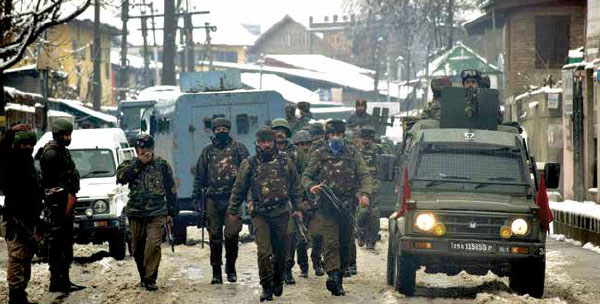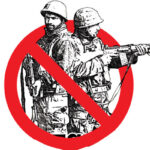- Cover Story
- Governance
- Globe Scan
- Corruption
- State Scan
- Talk Time
- Cover Story
- Governance
- Globe Scan
- Corruption
- State Scan
- Talk Time
Recent Posts
© Copyright 2007 - 2023 Gfiles India. All rights reserved powered by Creative Web INC.GovernanceA case of an FIR and an award
The army is confused, even angry. The reason: AFSPA, or rather the dilution of it
Brijesh D JayalSeptember 12, 20184 Mins read566 Views
 Written by Brijesh D Jayal
Written by Brijesh D JayalIT is ironical that on the eve of the 72nd Indian Independence Day, the Supreme Court of India should be witness to hearing of a petition by over 300 serving army personnel across ranks, appealing against the dilution of the Armed Forces Special Powers Act (AFSPA). The petitioners contend they ‘believe that sovereignty, security and integrity of the nation is at higher pedestal than even the Constitution of India’ and that the ultimate sacrifice required of a soldier ‘cannot be sustained under a state of confusion or cloud as to the bonafide duty itself’.
Further, they ‘are now facing confusion and countering questions from the soldiers under their command, as to whether they are supposed to continue to engage the proxy war and insurgency with their military training, principles, standard operating procedures, operational realities, valour and courage or act and operate as per the yardsticks of peace time operations, law and order issues and CrPC.’
When soldiers of an army that has been tasked with counter-insurgency operations in some states for decades admit to confusion amongst their ranks, this must mark a dangerous low in the history of both the Republic and the armed forces and reflects on the very fragile state of civil-military relations. This is a historic low in civil-military relations for two other reasons. First, because never has a body of serving personnel chosen to by-pass traditional hierarchy and knock directly at the doors of the highest court and second, because group action by serving personnel is strictly against good order and military discipline.
When soldiers of an army that has been tasked with counter-insurgency operations in some states for decades admit to confusion amongst their ranks, this must mark a dangerous low in the history of both the Republic and the armed forces and reflects on the very fragile state of civil-military relations
The immediate provocation for this unprecedented step may appear to be the case of an FIR filed by the J&K police against Maj. Aditya Kumar of Garhwal Rifles and others, for a bonafide action they took recently in Shopian against stone-pelters when the latter threatened to lynch one of the JCOs and which resulted in deaths of three civilians. In response, Maj. Aditya’s father Lt Col Karamveer Singh, also a serving officer, has filed an appeal in the Supreme Court requesting quashing of this FIR and terming the stone-pelters as terrorists.
But to all who wish to see, this historic low was long in coming and if there is any surprise it can only be the sheer indifference of successive governments and Parliament not to weigh the consequences of a near-permanent deployment of the army on counter-insurgency duties in parts of the country.
It is worth recalling an incident in J&K in the pre-election period in 2014 when the army had been compelled to shoot dead two civilians because their vehicle refused to stop at two check points.

This opportunity was taken by many to denigrate the Army and even attempt scoring electoral brownie points, putting the Army on the back-foot. At the time a reputed national daily in an editorial patronisingly asked “Why do soldiers patrolling civilian areas in Kashmir shoot to kill, so easily? The answer, in five letters, is AFSPA.” Yet the Editorial failed to ask an even more fundamental question. Why is it that areas of the state continue for years to be declared “disturbed” under a democratic government? Further, if the writer had taken the trouble to study case histories of the 362 army suicides that the defence minister had referred to at that time, it would perhaps have dawned that the stress of prolonged deployment in counter-insurgency duties is a contributing factor to stressed reaction, perhaps resulting in the lack of judgment and collateral damage.
THE AFSPA is often painted by vested interests as an instrument used by the services to shield their human rights abuses. Neither the lawmakers who have made this law nor the state governments that declare areas ‘disturbed’ to enable implementation of the law, choose to dispel this motivated notion, preferring to remain ambivalent for political convenience. What better example of such ambivalence than award of the Shaurya Chakra for gallantry to Maj. Aditya Kumar by the President of India alongside an FIR by the J&K police?
Hybrid warfare is a military strategy that employs political warfare, blending it with conventional warfare and other means such as fake news and psychological warfare and operates across many fields. Clearly interests inimical to India and protagonists of this hybrid war will be encouraged with the latest happenings in the Supreme Court
Amongst all the institutions of our democracy, the armed forces can rightly claim to hold a unique status, because every professional military person is honour-bound to protect the sovereignty and integrity of the nation even at the peril of one’s life. The foundations of this contract of unlimited liability on the part of the uniformed fraternity for the larger good of the society are based neither on the laws of the land nor on rules of governance, but on mutual trust and moral and ethical conduct on the part of both parties.
Over the years for various reasons, civil-military relations in India have not reflected this ideal—not for unwillingness on the part of the armed forces, but of reservations of various kinds on the part of the civil leadership which continues to the take the armed forces and their sacrifices for granted. When, for example, did we last see a serious debate on matters of defence and security in Parliament? Why, for instance are the armed forces being kept out of national security policy making? And why the reluctance to introduce much-needed changes to the higher defence organisation? Noted strategic thinker K. Subramanian had aptly described civil-military relations in India as: ‘politicians enjoy power without responsibility, bureaucrats wield power without accountability, and the military assumes responsibility without direction.’
HYBRID warfare is a military strategy that employs political warfare, blending it with conventional warfare and other means such as fake news and psychological warfare and operates across many fields. Clearly interests inimical to India and protagonists of this hybrid war will be encouraged with the latest happenings in the Supreme Court.
Many national armies, including our neighbour in the west, have undermined their democracies is an internationally accepted fact. In its indifference towards the prolonged use of the army in counter insurgency duties, let Indian democracy not be the first to reverse this by undermining its own army. Let this be a wake-up call.
The writer is retired Air Marshal
Recent Posts
Related Articles
GovernanceNewsBackdoor entry of Private players in Railway Production Units ?
Written by K. SUBRAMANIAN To Shri G C Murmu C&AG Dear Shri Murmu,...
ByK. SUBRAMANIANFebruary 22, 2024GovernanceNailing Labour to The Cross
Written by Vivek Mukherji THEY grease the wheels of India’s economy with their...
ByVivek MukherjiMay 5, 2020GovernanceBig Metal Momentum
Written by GS Sood PRECIOUS metals especially gold and silver are likely to...
ByGS SoodMay 5, 2020GovernanceStrengthening Social Enterprise Ecosystem: Need for systemic support from the Government
Written by Jyotsna Sitling and Bibhu Mishra THE world faces several challenges today....
ByJyotsna Sitling and Bibhu MishraMay 5, 2020 - Governance
- Governance


























































